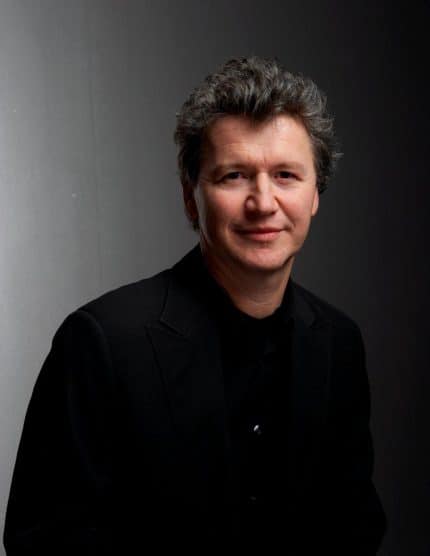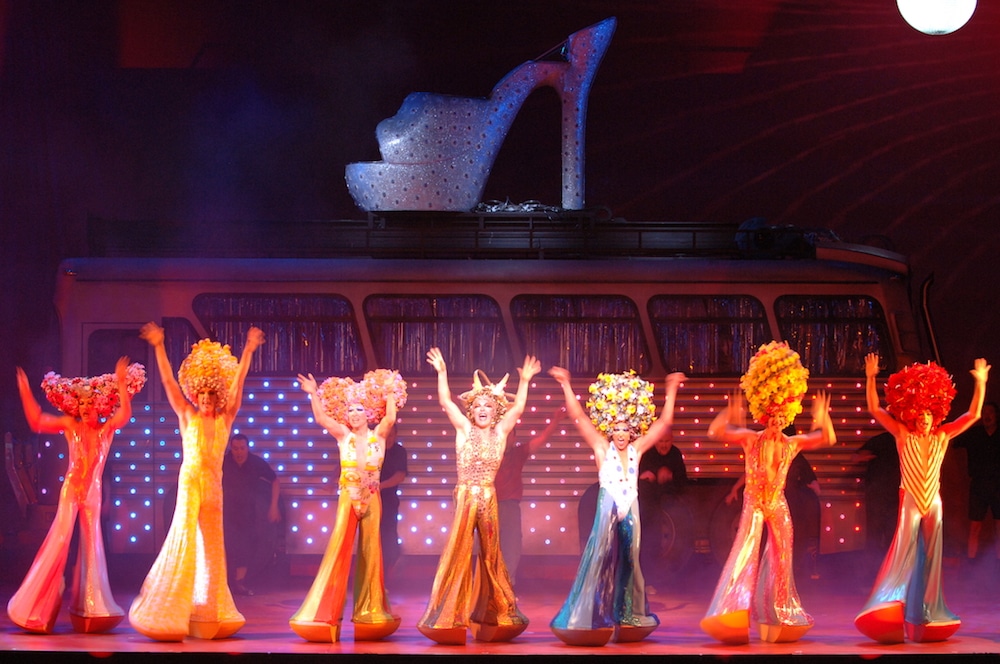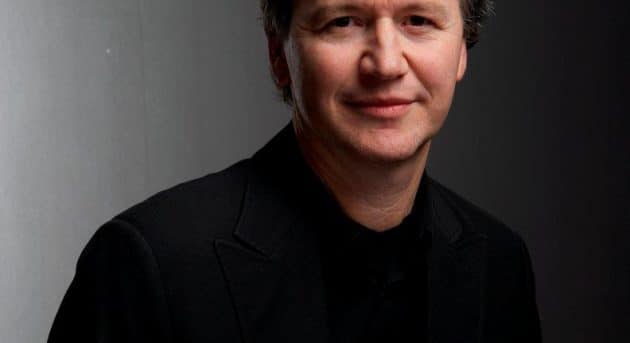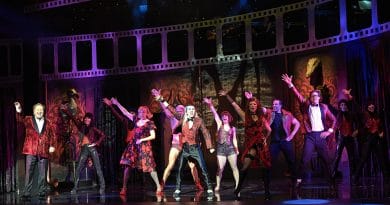Backstage at Priscilla: Adele Parkinson in conversation with Simon Phillips
Tap on to Australia’s most iconic bus and meet the cast riding aboard as they travel the country in 2018. Each fortnight, Priscilla cast member Adele Parkinson switches gears to interview a member of the team and share their stories and insights from behind the scenes of this fabulous Aussie musical.

Before I say anything, let it be known that I absolutely love my job. The bright lights, the late nights, the tight tights. I can’t think of anything I’d rather be doing. However, there are some parts of the job that I love less than others. One of those parts is tech week.
For anyone unfamiliar with the concept, tech week happens after rehearsals, once the show has “bumped in” to the theatre, and is when all the technical elements are added. Some might say that, if something unexpected is going to happen on a show, it’ll probably happen during tech week. Some thoughts I’ve had on stage this week include:
“Man, I can’t see anything back here – is that an alpaca?
“Priscilla better behave herself today, I’m not wearing clean underwear.”
“Did anyone else see that glitter curtain try to kill me?”
“Run. RUUUUN!”
It is said that you should do one thing every day that scares you, however tech is not just scary, it’s long. Over the last six days, most of the cast averaged 12 hours per day either at the theatre or travelling to it, and the crew have put in even longer hours. For me, sleep is required in abundance, so when I’m not rehearsing my limited remaining hours are spent (weeping) in the shower, (weeping) at meal time or (weeping) over this keyboard trying to write this article. It’s a stressful, exhausting time and by day six I’m dehydrated and aching for a day off.
Although our work to life ratio isn’t completely balanced and our risk of being hit by a bus has increased, tech week has many positive attributes too. It’s the first time we get to meet the crew, hear the band, wear the costumes, see the set, and meet our star, the famous Priscilla! By the end of tech week, we’ll do a full run with all the elements in place, and then it’s showtime!
To celebrate tech week, I interviewed the one at the controls, our director, Mr Simon Phillips.
Simon should be on every actor’s “directors to work with” bucket list. He has long been associated with the Melbourne Theatre Company where he held the position of Artistic Director for 12 years. He is as well known for directing classical theatre and opera as contemporary plays and new musicals and has pretty much won every directing award under the sun. His screen-to-stage adaptations include Priscilla Queen of the Desert, Ladies in Black, An Officer and A Gentleman, and the recent success Muriel’s Wedding. I was extremely grateful that Simon allowed me to pull him away from the chaos of tech for this interview.
How do you describe what you do?
I’m always really embarrassed when strangers ask me what I do. A good proportion of my job is about coordinating a whole lot of people who are very talented and trying to create an environment in which they can do their very best in whatever given area of expertise they’re working. The other side of it is working out how best to tell a story. For me personally, I have ended up working on a lot of new work, it’s what I do more than anything else now. When you’re working on new material, there is a more complex set of goals about the nature of narrative. Then when you’re working in Musical Theatre, that becomes even more complicated. If you’re working on a straight play, words, visual imagery and sound contribute to the way in which you tell the story. Those are the building blocks you’ve got to play with. If you’re working in Musical Theatre, you have more languages at your disposal and all the pros and cons of that. In a sentence, my role as a director is to disseminate everyone’s skills over the given story to bring it to life.
How do you manage creative expectations on large scale projects like Priscilla?
Right from the beginning, you’re trying to get the advantage of not being so fixed about how you have imagined something that someone can’t actually improve it. You have to leave the door open for the other brains that you’re using to go: “Yes, you’ve given me this apple and now I’m going to shine it and if we actually cut it in half and turned it around like that it might look better”. You really want to keep that through the entire creative process. Whether you’re working with a designer and you come in and go: “In the way that I’m seeing this work, these are the most important ingredients” or with an actor you may say: “These are the lines you’ve been given and this is where I think the emotional arc is in the scene”. It’s never: “This is what the emotional arc is in this scene. You must submit!” The more fluidity there is in the creation of a work, the more likely you are to double the good things about it. That said, if something comes along that destroys your initial image of what it was going to feel like, it can be not very much fun. But I’ve rarely found that getting super stressed and shouting at people gets anything better done than trying to stay calm.

How sympathetic are you to the plight of the actor during casting?
I’m really conscious of the horror of the auditioning situation. Most of my energy in auditions goes in to getting actors relaxed enough for their natural personality to come through. In casting, you’re looking for the essence of who the person is that you’re trying to cast. If the essence that an actor possesses is not the essence you as a director think you’re looking for then that’s not their fault. It’s just that you as director have a sense of the divine spark that’s inside that character that you feel is the most important thing. One of the things I always find when I’m casting is that for 85-90% of the people that come in I think, “Ah, if only I was doing that show, this person would be perfect in it”. You can see the quality that person has that’s so them and special and great but there’s nothing you can do about it if the show you’re casting doesn’t have that role in it. That’s the reality of the job for the actor. If it’s too traumatic for you, and you take your rejection as personal rather than pragmatic, then you’re probably not the right personality.
What are your artistic aspirations at this stage of your career?
I’ve never been able to answer that question. I don’t have a burning ambition to achieve anything next. I love doing what I do. I like making new stuff, I really love that feeling. Sometimes I think that I wouldn’t mind doing a bit more stuff where someone gives me a script that exists – something that is not as fluid as a new work – then it’s purely about you as a director. When you go in to direct a new work, a whole other set of skills are required; you’re partly dramaturging it as well as directing. It’s much more work but by the same token, it’s very exciting. One of the great joys of the profession we’re in is the constant variety. Every project has a whole new set of parameters and a whole set of new people and a whole new set of challenges and, even though it’s tiring, it is refreshing.
What advice can you give to emerging artists?
Be kind to others. It’s not worth getting what you want at the expense of other people’s dignity. Enjoy respecting everyone else for what they’ve got to contribute. And remember: it’s called a play.
Fortunately, with Simon sitting calmly at the helm of what can only be described as a dream team of queens, the show is in great shape and we are now in performance mode ahead of our official opening on January 30!
Priscilla Queen of the Desert is playing at Melbourne’s Regent Theatre from January 21, 2018.
For more, go to priscillathemusical.com.au




